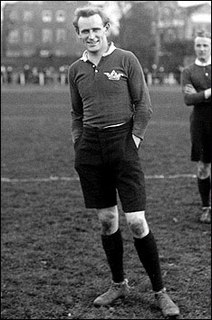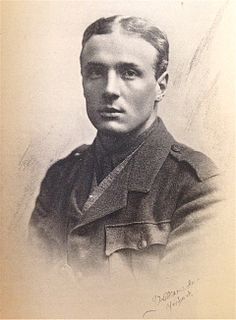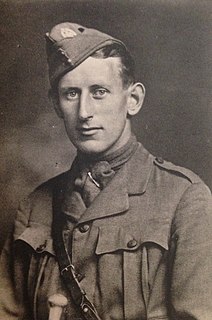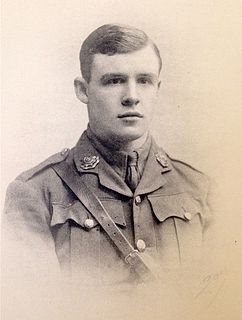
Ronald 'Ronnie' William Poulton was an English rugby union footballer, who captained England. He was killed in the First World War during the Second Battle of Ypres.
Sir George Cunningham was an administrator in British India who in his early years was a notable sportsperson, representing and later captaining the Scottish national team at rugby union.

William Purdon Geen was a rugby union wing and centre, who represented Wales, and played club rugby for Oxford University and Newport and county rugby for Monmouthshire. He was also invited to play for the Barbarians on several occasions. Geen unsuccessfully trialled for England in 1910, but was selected and played for Wales on three occasions in the 1912–1913 season. Injury prevented him from playing more internationals, and his service in the First World War put an end to his career.

Paul Robert Clauss was a German-born rugby union three-quarter who played club rugby for Oxford and Birkenhead Park. Clauss was a member of the first official British Isles tour in 1891 and also represented Scotland on six occasions. He was part of two Triple Crown winning teams for Scotland, and made an impressive international start in the 1891 Championship, scoring in all three Scotland games.
Piercy Henderson "Dolly" Morrison was an English rugby union three-quarter who played club rugby for Northern and Cambridge University and played international rugby for England.
Charles Alexander Hooper was an English rugby union forward who played club rugby for Cambridge University and Middlesex Wanderers and international rugby for England. In 1890 Hooper became one of the original members of the Barbarians Football Club.
Mason Thompson Scott was an English international rugby union half back who played club rugby for Cambridge University and Northern. Scott played international rugby for England and was an original member of invitational team, the Barbarians.
John Maxwell Batten was a rugby union fullback who played club rugby for Cambridge University and international rugby for England.
William Martin Scott was an English international rugby union half back who played club rugby for Cambridge University and Northern. Scott played international rugby for England and was an original member of invitational team, the Barbarians. He also played first-class cricket for Cambridge University.
Launcelot Jefferson Percival KVCO was an Anglican priest who in addition to various parish posts served in the Ecclesiastical Households of Queen Victoria, King Edward VII, King George V, King Edward VIII and King George VI.
William Thomas Charles Cave was an English international rugby union forward who played club rugby for Cambridge and Blackheath. Cave played international rugby for both the British Isles and England, and was also selected for invitational team the Barbarians.
Lt. Colonel Gilbert Faraday Collett DSO was an English sportsman who was an international rugby union wing and first-class cricketer for Gloucestershire County Cricket Club. As a rugby footballer he represented Cambridge University and Cheltenham at club level. Collett also played international rugby for the British Isles during the 1903 tour of South Africa but was never selected for the England national team.

Charles Gurdon was an English rower and rugby union forward who played club rugby for Cambridge University and Richmond. Gurdon represented England fourteen times during the early development of international rugby union, once as captain. He and his brother Edward Temple Gurdon formed one of the most notable sibling pairings in English rugby.

William "Willie" Middleton Wallace was a rugby union player. He played fullback for Cambridge University RFC and was capped for Scotland in 1913–14.
Robert William Bell was an English international rugby union forward who played club rugby for Cambridge University and Northern. Bell played international rugby for England.
Henry Vassall was an English rugby union player, best known as a centre for Oxford University. Vassall played international rugby for England in the early years of the sport, winning five caps and scoring a hat-trick of tries in the first encounter between England and Wales.

Arthur "Mud" James Dingle was a rugby union centre and wing, who won three caps for England, and played for County Durham, Hartlepool Rovers and Oxford University.

Francis Nathaniel Tarr was an English international rugby union player. He played centre for the Leicester Tigers and, between 1909 and 1913, won four caps for England, scoring two tries. He also earned three Blues while reading law at Oxford.
Herbert Laxon was an English rugby union halfback who played club rugby for Cambridge University winning sporting Blues in 1903 and 1904. Although never capped internationally for England, in 1908 Laxon was selected to join Arthur Harding's Anglo-Welsh tour of New Zealand and Australia playing in one Test match against New Zealand.
William Roberts was a Welsh international forward who played club rugby for Oxford University, London Welsh RFC and Cardiff RFC. He won a single cap for Wales in the 1929 Five Nations Championship.







